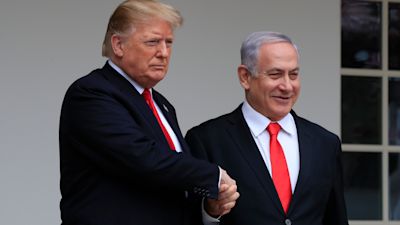What Donald Trump's victory means for the Middle East

Before you worry about the second Trump presidency, perhaps you should first worry about what might happen between now and his inauguration on January 20.
The seismic political changes heralded in by this US election are now conspiring with great volatility and extremism to make the next ten or so weeks in the Middle East a daunting prospect.
Israel is currently on high alert expecting an Iranian drone and/or missile attack that would amount to retaliation for Israeli strikes on military targets in Iran on October 26.
But the re-election of Donald Trump may give Tehran pause for thought. They have good reason to fear the man. In 2018, he tore up the nuclear agreement that allowed for some rapprochement with the west.
Two years later he ordered the assassination of Iran’s top security official, Qasem Soleimani, in a missile strike in Baghdad. The Israelis regarded his killing as so escalatory that they took no part in the operation.
With their air strikes on October 26, the Israeli Air Force disabled Iranian air defence systems to such an extent that Prime Minister Benjamin Netanyahu has boasted Israel can now hit anywhere in the country.
He will be telling the Americans that there is no better time than now to strike at Iran’s nuclear programme.
Iran has been a threshold nuclear power for the last 25 years but for various reasons has not crossed that threshold.
It may now have changed its mind and want to develop the bomb as soon as possible.
Not only have its proxies been greatly weakened, but Donald Trump will soon be back in the White House and the ayatollahs may decide that the ultimate deterrent is something they must possess to keep him at bay.
Subscribe free to our weekly newsletter for exclusive and original coverage from ITV News. Direct to your inbox every Friday morning.
The received wisdom is that Israel can’t do it alone and that only the United States has a bomb big and penetrative enough to reach nuclear sites deep underground.
The bunker buster needed for the job is called a GBU-57 and it weighs 30,000lbs. Israel doesn’t have that weapon in its arsenal nor does it have an aircraft big enough to carry it.
Planes that can carry it include the venerable B-52, several of which the US Air Force deployed in the Middle East at the weekend.
As President Biden has repeatedly said, America’s commitment to Israel’s defence is ironclad. The B-52 is not a defensive weapon and its arrival in this region sends a signal about American preparedness to go on the offensive.
Want an expert briefing on US politics and the presidential race? Listen to our latest podcast Talking Politics USA